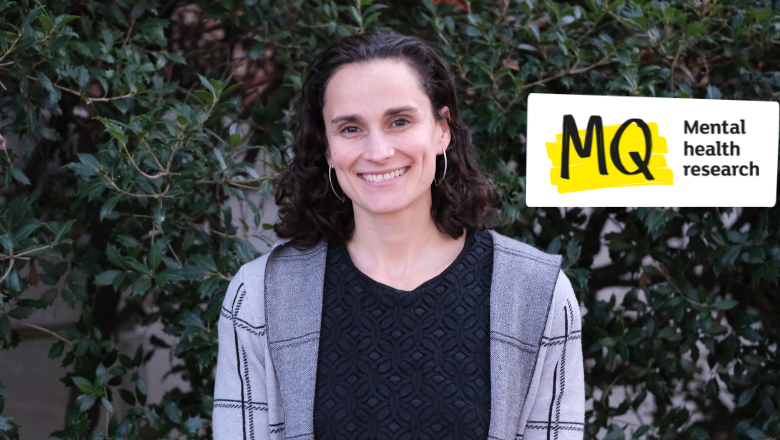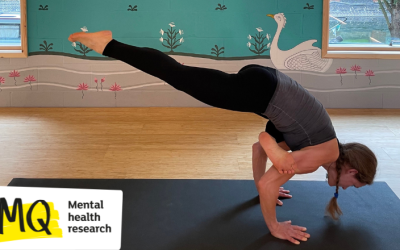This week it's International Women's Day (8th of March) and this month is Women's History Month. Women are making history in research, some of them working with MQ. One such woman is Marisa Marraccini, one of the researchers selected to be a US Fellow for MQ in 2022.
Applications to become an MQ fellow in the USA are opening soon. The opportunity will mean researchers in the USA who are selected will receive not only financial support but also practical support from the MQ team. But what is it like to apply and be selected for an MQ fellowship?
The talented Marisa Marraccini kindly shared with us the inside story of the MQ Fellows application and selection process and what being an MQ fellow is really like.
How did you find out about MQ Mental Health Research initially and the MQ Fellowship opportunity?
I was incredibly lucky to learn about this funding call from some of my colleagues, who received information via email, read about the award and thought of my work as a good fit. At least two different colleagues forwarded the call – and I immediately felt inspired to apply.
Can you tell us about why you applied to be an MQ fellow?
Up until recently, my work had primarily used mixed methods approaches to intervention design, with my qualitative approaches heavily influenced by user-centred design. But this call, which prioritized patient and public involvement, pushed me towards prioritizing principles of co-design. I already felt moved to push my intervention to better meet the needs of hospitalized teens often overlooked in research, and this call gave me the idea to focus on partnering with youth to do so.
What was your background before applying for the fellowship? And what study did you apply to conduct?
For the past several years I have been engaged in research that aims to improve supports and processes for youth returning to schools following psychiatric hospitalization for suicide-related crises – in the hope that we can leverage school context to improve recovery and prevent suicide.
Most recently, I have been developing and testing a virtual reality intervention delivered to teens during hospitalization – this intervention teaches therapeutic skills and gives them practice opportunities in an immersive school environment in using them. My MQ Fellows Award is allowing me to improve this work.
By partnering with youth hospitalized for suicide-related crises, we aim to expand these practice opportunities to be relevant for youth with high risk for suicide and youth often overlooked in research: Specifically, racial and ethnic minoritized youth and youth identifying as LGBTQIA+.
What was your experience of the application process?
I took the application process a step at a time. Beginning with the letter of interest, I outlined my goals for the project. Once I was invited to submit a full application, I emailed with a lot of questions! MQ helped answer them all. The full proposal helped me better conceptualize my ideas, but also certainly took a fair amount of time.
Finally, I was invited to present my proposal, answering questions from the awards committee. This might have been the most nerve-wracking part, but it was also the most exciting.
Tell us about the moment you found out you became an MQ fellow. How were you told and how did you feel?!
I received an email from Hala Rachidi at MQ mid-December 2022. I was thrilled! I immediately responded with my gratitude to Hala – who, at that point, I felt I had gotten to know throughout the proposal process. I felt very connected and excited to work with such a wonderful group.
What happened after receiving the fellowship?
I took some time to breath. Then, once the contract negotiations were complete, I began to work on my institutional review and prepare for the study. I extended my start date by 6 months to align with some of my other research activities and have been focused on some of the logistical aspects of the project since beginning in July 2023. These aspects include contract negotiation, recruitment database, and safety procedures.
What has happened in the project thus far and where are you currently with the research?
This project will occur over three years. During the first phase of the project, I have been engaged in learning more about co-design, specifically focusing on developing and refining our co-design activities and safety protocols for partnering with youth with lived experience regarding suicidal thoughts and behaviors.
In the fall of 2023, I attended research sessions focused on partnering with individuals with lived experience at the International Academy of Suicide Research (IASR) and American Foundation for Suicide Prevention (AFSP) Summit on Suicide Research. Informed by these presentations, I further developed my protocols and sought out feedback from the community.
My team and I have been preparing for recruitment throughout this time and expect to begin actively recruiting adolescent partners this spring (2024), specifically with a history of hospitalization for suicide-related crises.
What are the plans for the project moving forward?
Over the next 2.5 years, I will continue with mentored experiences and complete my research aims that involve partnering with youth to improve our virtual reality intervention and conducting a pilot clinical trial to explore feasibility and acceptability of the revised intervention.
How has MQ helped you network with other researchers or mentors?
As part of my involvement with MQ, I have networked with other researchers focused on suicide prevention and presented my work in London and New York. In London, I was able to connect with one of my mentors on the project, Dr. Petr Slovak, in person. That was a real treat.
What are the biggest benefit of being an MQ Fellow?
As an MQ Fellow, I feel like I am part of an international research community that includes both MQ staff and MQ researchers. MQ helped facilitate additional partnerships and opportunities for me by partnering with other funders (AFSP) in support of this work, and by introducing me to other researchers and community members with similar passions.
MQ’s research team are based in London, UK while you’re in the US. Are there any advantages or disadvantages to that?
Although there is at least one drawback to being a US-based researcher being supported by a London-based research team - mainly, the instability of the conversion rate when preparing my budget - overall, it’s been a positive experience.
Working with a London-based organization whilst being based in the US means I am a part of a global community. Being part of the MQ community has helped launch my career from a US focus towards making a global impact as well as allowing me to learn and grow as a scientist in an international community.
How has the MQ fellowship affected your career?
This fellowship has been incredibly helpful for my career. It has provided funding towards improving my intervention and is also furthering my own learning as a scientist. The call itself inspired an entirely new approach to my research that has already resulted in other funded awards in pursuit of improving youth mental health.
Many thanks to Marisa for taking the time to talk to us and share her experience.
If you’re interested in Marisa’s experience and you yourself would like to apply for the next round of MQ Fellowships, find out more about the 2024 Fellows opportunity and how to apply on the MQ Fellows Award page.



